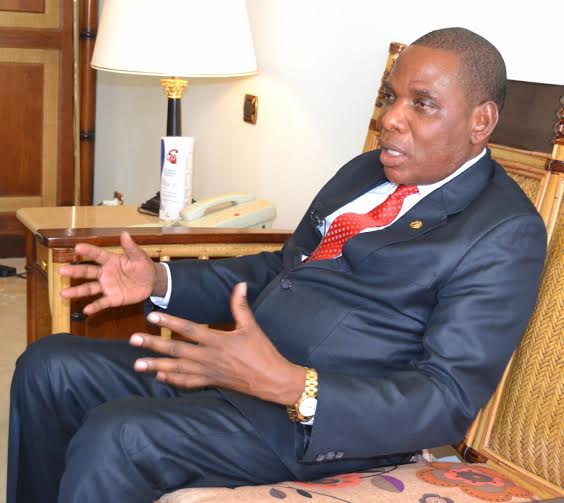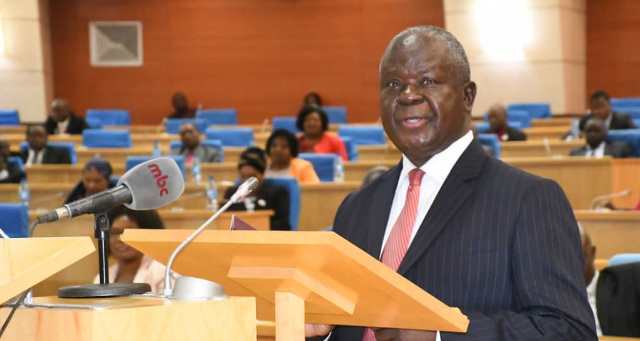
The former governing Democratic Progressive Party (DPP) has expressed disappointment with Tonse 2021/2022 National Budget describing it as ‘unrealistic and pro-rich’.
DPP’s Spokesperson on Finance, Joseph Mwanamvekha, made the remarks on Friday after Minister of Finance Felix Mlusu presented K1.9 trillion National Budget for 2021/2022 financial year,
Mwanamvekha said poor people are not going to benefit from the budget because various tax measures laid out in the budget are not favouring them. He said the tax measures are instead favouring rich people.
He also wondered how government will implement the estimated budget with a depreciating kwacha, the absence of donors and poor sales of the tobacco.
Mwanamvenkha also blamed the government for having twisted priorities citing the decision to subsidize beer over cooking oil which he says would have benefited more people.
Reading out the Budget statement titled, “Building Back Better: Achieving aspirations of the nation together” at Parliament building in Lilongwe, Mlusu said the National Budget would continue to deliver on campaign promises that the Tonse Alliance made ahead of court sanctioned June 23, fresh Presidential elections.
He announced that government would introduce a duty free week for imports not exceeding US$ 3,000 once a year in a bid to boost businesses of small scale businesses.

“Government is introducing a duty-free week for imports not exceeding US$3,000 to boost the growth of small businesses and to reinvigorate the economy suffering from the effects of Covid-19 pandemic. Taxpayers will benefit from this facility once a year,” the Minister said.
Mlusu said government has scraped off duty on importation building materials for churches and mosques.
He said government has introduced new Pay As You Earn (PAYE) brackets of 25 percent for incomes between K100, 000 to K1 million to increase disposable income for low income earners.
This development comes on the back of a K100, 000 tax free band which Government started implementing last year.
“Accordingly, the new monthly PAYE schedule will be K0 to K100,000 at 0 percent; between K100,000 to K1.0 million at 25 percent; between K1.0 million to K3.0 million at 30 percent; between K3.0 million to K6.0 million at 35 percent; and from K6.0 million and above at 40 percent.
“This will promote distribution of wealth in the country and increase disposable income for all low income earners,” he said.
Mlusu disclosed that government has drafted a policy to scrape off electricity connection fees.
“The Ministry of Energy has completed drafting of the Free Electricity Connection Policy which will provide a platform for free connections to individuals and public institutions in the rural and peri-urban areas.
“Under this arrangement, connection fees which average K17, 500 will be scrapped off. Implementation will commence during the 2021/2022 fiscal year. A similar approach is being worked out for the implementation of free water connections,” he said.
Mlusu said government was determined to continue with Agriculture Input Subsidy (AIP) to make sure small scale farmers continue accessing farm inputs and boost the country’s food security.
“Government introduced the Affordable Inputs Program, which targeted 4.2 million farm families. This programme is a success.
“It has not only helped to achieve food security but also contributed to creation of jobs and business opportunities to small and medium scale enterprises especially those in the transport and real estate sectors,” Mlusu said.
He said K142.0 billion has been allocated to the AIP which is expected to achieve an outreach of not less than 3.5 million farming families.
Other highlights in the budget include construction of 15 roads across the country, commencing construction works for Inkosi M’mbelwa University, completing construction of 92 new secondary schools and construction of rural community hospitals at Domasi and Mponela
The budget which will be implemented for nine months, from July 2021 to March 2022 has an estimated deficit of K718.3 billion, which is 7.0 percent of the rebased GDP, and markedly lower compared to 8.8 percent of GDP during the 2020/2021 fiscal year, according to Mulusu.
He said the deficit would be financed through foreign borrowing amounting to K134.8 billion and domestic borrowing amounting to K583.5 billion.
In terms of allocations to sectors, the Education sector has been allocated the largest portion of the budget at K327.3 billion, representing 16.5 percent of the total budget.
It is followed by the Agriculture Sector which has been allocated K284.4 billion, representing 14.3 percent of the total budget and the Health Sector which has been allocated K187.2 billion representing 9.4 percent of the total budget.
The Minister said unlike the previous budget which was implemented at the peak of the pandemic, prospects for the 2021/22 budget were brighter.
“Although risks from the third wave remain high considering that some parts of the global village, including countries that are Malawi’s major trading partners have been affected,” he added.
Meanwhile, President of the Economics Association of Malawi (ECAMA), Lauren Nyasulu hailed the budget and commended government for coming up with a good budget amidst tough economic challenges.

